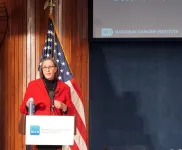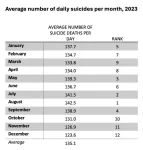(Press-News.org) Many recent studies assume that elderly people are at particular risk of dying from extreme heat as the planet warms. A new study of mortality in Mexico turns this assumption on its head: it shows that 75% of heat-related deaths are occurring among people under 35―a large percentage of them ages 18 to 35, or the very group that one might expect to be most resistant to heat.
“It’s a surprise. These are physiologically the most robust people in the population,” said study coauthor Jeffrey Shrader of the Center for Environmental Economics and Policy, an affiliate of Columbia University’s Climate School. “I would love to know why this is so.” The research appears this week in the journal Science Advances.
The researchers chose Mexico for the study because it collects highly granular geographical data on both mortality and daily temperatures. The researchers reached their conclusions by correlating excess mortality―that is, the number of deaths above or below the average―with temperatures on the so-called wet-bulb scale, which measures the magnified effects of heat when combined with humidity.
The analysis found that from 1998 to 2019, the country suffered about 3,300 heat-related deaths per year. Of these, nearly a third occurred in people ages 18 to 35―a figure far out of proportion with the numbers in that age bracket. Also highly vulnerable: children under 5, especially infants. Surprisingly, people 50 to 70 suffered the least amount of heat-related mortality.
Based on this, “we project, as the climate warms, heat-related deaths are going to go up, and the young will suffer the most,” said the study’s co-lead author, R. Daniel Bressler, a PhD. candidate in Columbia’s Sustainable Development program.
The researchers say several factors may be at work. Young adults are more likely to be engaged in outdoor labor including farming and construction, and thus more exposed to dehydration and heat stroke. The same goes for indoor manufacturing in spaces that lack air conditioning. “These are the more junior people, low on the totem pole, who probably do the lion’s share of hard work, with inflexible work arrangements,” said Shrader. Young adults are also more likely to participate in strenuous outdoor sports, the researchers point out. A previous separate analysis by Mexican researchers showed that death certificates of working-age men were more likely to list extreme weather as a cause than those of other groups.
The vulnerability of infants and small children came as somewhat less of a surprise. It is already known that their bodies absorb heat quickly, and their ability to sweat, and therefore cool off, is not fully developed. Their immune systems are also still developing, which can make them prey to ailments that become more common with humid heat, including vector-borne and diarrheal diseases.
Wet bulb temperatures are often converted by popular media into “real-feel” heat indexes on the Fahrenheit scale, where numbers can vary depending on the exact combination of heat and humidity. According to the study, wet-bulb temperatures of around 13 C (equivalent to 71 F with 40% humidity) are ideal for young people; in this range, they suffer minimum mortality. Previous research has suggested that workers begin to struggle when wet-bulb temperatures reach about 27 degrees C, which would equate to 86 to 105 F, depending on humidity. However, the new study found that the largest number of deaths occurred at wet-bulb temperatures of just 23 or 24 C, in part because those temperatures occurred far more frequently than higher ones, and thus cumulatively exposed more people to dangerous conditions.
Using the same daily temperature and mortality data, the researchers found that elderly people died predominantly not from heat, but rather modest cold. (Mexico is mainly tropical and subtropical, but has many climate zones including high-elevation areas that can get relatively chilly.) Among other things, older people tend to have lower core temperatures, making them more sensitive to cold. In response, they may be prone to staying indoors, where infectious diseases spread more easily.
Despite all the attention given to the dangers of global warming, extensive research has revealed that cold, not heat, is currently the world’s number one cause of temperature-related mortality, including in Mexico. However, the proportion of heat-related deaths has been climbing since at least 2000, and this trend is expected to continue.
The new study has global implications, say the researchers. Mexico is a middle-income country; by share of population under 35, it is about average, and some 15% of workers are employed in agriculture. By contrast, many poorer, hot countries, mainly in Africa and Asia, have much younger populations that work in manual labor at much higher percentages. Thus, if Mexico is any indicator, heat-related mortality in those nations could be massive. A study published last year showed that farmworkers in many poor countries are already planting and harvesting amid increasingly oppressive heat and humidity.
Bressler said the team is now looking to firm up its conclusions by expanding its research into other countries, including the United States and Brazil.
The study was co-led by Andrew Wilson of Stanford University. Coauthors include Cascade Tuholske of Montana State University; Colin Raymond of the University of California, Los Angeles; Patrick Kinney of Boston University, Teresa Cavazos of the Centro de Investigación Científica y de Educación Superior de Ensenada, Baja California; and Catherine Ivanovich, Radley Horton and Adam Sobel of the Columbia Climate School.
END
High heat is preferentially killing the young, not the old, new research finds
In Mexico, workers under 35 and small children suffer most
2024-12-06
ELSE PRESS RELEASES FROM THIS DATE:
Pioneering survey methodology sets new standards for gauging global scientific consensus
2024-12-06
-With images-
A pioneering international study led by Professor Peter Vickers of Durham University introduces a novel methodology for rapidly assessing scientific consensus on a global scale.
This innovative approach offers the ability to collect real-time, representative data on scientists' opinions across fields, geographical locations, and over time – a breakthrough that could reshape policy-making and public understanding in fields from health sciences to climate change.
The study, conducted in June 2023, brought together a global network ...
A connection between quantum theory and information theory proved
2024-12-06
“Our results have no clear or direct application right now. It’s basic research that lays the foundation for future technologies in quantum information and quantum computers. There’s enormous potential for completely new discoveries in many different research fields,” says Guilherme B Xavier, researcher in quantum communication at Linköping University, Sweden.
But to understand what the researchers have shown, we need to start at the beginning.
That light can be both particles and waves is one of the most illogical – but at the same time fundamental – characteristics ...
How do marine food webs respond to increasing alkalinity?
2024-12-06
The ocean naturally absorbs a quarter to a third of man-made CO2 emissions, but this process also leads to the acidification of seawater. By increasing the alkalinity of seawater through the addition of certain minerals (e.g., carbonates and silicates), the ocean can chemically bind more CO2 without further acidification. However, there is still little research on the environmental effects of Ocean Alkalinity Enhancement (OAE). Scientists from Prof. Ulf Riebesell´s group at GEOMAR Helmholtz Centre for Ocean Research Kiel, as ...
NCCN hosts patient advocacy summit on improving access to accurate health information
2024-12-06
WASHINGTON, D.C. [December 6, 2024] — The National Comprehensive Cancer Network® (NCCN®)—a non-profit alliance of leading cancer centers—hosted a Patient Advocacy Summit in Washington, D.C., today. The annual event brings together leading experts to promote strategies and best practices for improving cancer care. This year’s summit focused on practice and policy solutions for sharing accurate, evidence-based health information with patients and caregivers. It featured a keynote address from W. Kimryn Rathmell, MD, PhD, MMHC, Director of the National Cancer Institute (NCI), along with panel discussions that included Robin Vanderpool, DrPH, Chief of the ...
New hope in the fight against Hepatitis C: Broadly effective innovative vaccine design
2024-12-06
Globally, approximately 58 million people are chronically infected with HCV, resulting in 290,000 annual deaths due to complications such as liver cirrhosis and liver cancer. Although modern antiviral treatments achieve high cure rates, the global elimination of HCV remains a difficult goal due to inadequate early detection and limited treatment options. Indeed, HCV has been identified as one of the globally prioritized endemic pathogens for vaccine research and development in the World Health Organization's “Immunization Agenda 2030.” It ...
Suicide rate is low during the holidays, but the holiday-suicide myth persists
2024-12-06
As in most years that we’ve followed news reporting about the myth that suicides peak during the end-of-year holidays, an analysis of the past year showed again that more newspaper accounts supported the false idea that the suicide rate increases during the holiday season than debunked it.
Over the past 25 years that we have been studying this phenomenon, in just over a third (nine years or 36%) have we found more debunking of the myth than support for it. Despite years of debunking by mental health researchers, journalists, and others, ...
New insights into NPC: A form of childhood dementia
2024-12-06
In the journal “Science Translational Medicine”, scientists from DZNE and LMU Hospital report on new insights into the mechanisms of “Niemann-Pick type C” (NPC), a rare neurodegenerative disease associated with dementia that can manifest as early as childhood. Their findings, based on studies in mice, cell cultures and patients, emphasize that neuroinflammation, which is mediated by the brain’s immune system, plays a crucial role in NPC. In addition, their research points ...
Love thy neighbor
2024-12-06
Helping out your neighbor or minding your own business? A challenging choice with different benefits for each decision. Game theory provides guidance in making such choices—from a theoretical perspective. Novel findings by Jakub Svoboda and Krishnendu Chatterjee at the Institute of Science and Technology Austria (ISTA) reveal new network structures that enhance cooperation throughout a system. These insights have potential applications also in biology.
The question of cooperation has puzzled scientists for a long time. Whether it is in the fields of biology, sociology, ...
So you want to build a solar or wind farm? Here’s how to decide where
2024-12-06
Deciding where to build new solar or wind installations is often left up to individual developers or utilities, with limited overall coordination. But a new study shows that regional-level planning using fine-grained weather data, information about energy use, and energy system modeling can make a big difference in the design of such renewable power installations. This also leads to more efficient and economically viable operations.
The findings show the benefits of coordinating the siting of solar farms, wind farms, and storage ...
Cholesterol, triglyceride, and glucose levels across birth cohorts in the US
2024-12-06
About The Study: In this cross-sectional study of 52,000 participants representing 264 million U.S. adults, population-level improvements in total cholesterol and triglyceride levels decelerated and adverse trends in glucose levels accelerated in more recent birth cohorts, which was partially mediated by concurrent increases in body mass index. Public health initiatives that target antecedent health behaviors are needed to improve cardiometabolic health across generations.
Corresponding Author: To contact the corresponding author, Xiaoning Huang, PhD, email jack.huang@northwestern.edu.
To access the embargoed study: Visit our For The Media ...
LAST 30 PRESS RELEASES:
Natural selection operates on multiple levels, comprehensive review of scientific studies shows
Developing a national research program on liquid metals for fusion
AI-powered ECG could help guide lifelong heart monitoring for patients with repaired tetralogy of fallot
Global shark bites return to average in 2025, with a smaller proportion in the United States
Millions are unaware of heart risks that don’t start in the heart
What freezing plants in blocks of ice can tell us about the future of Svalbard’s plant communities
A new vascularized tissueoid-on-a-chip model for liver regeneration and transplant rejection
Augmented reality menus may help restaurants attract more customers, improve brand perceptions
Power grids to epidemics: study shows small patterns trigger systemic failures
Computational insights into the interactions of andrographolide derivative SRJ09 with histone deacetylase for the management of beta thalassemia
A genetic brake that forms our muscles
CHEST announces first class of certified critical care advanced practice providers awarded CCAPP Designation
Jeonbuk National University researchers develop an innovative prussian-blue based electrode for effective and efficient cesium removal
Self-organization of cell-sized chiral rotating actin rings driven by a chiral myosin
Report: US history polarizes generations, but has potential to unite
Tiny bubbles, big breakthrough: Cracking cancer’s “fortress”
A biological material that becomes stronger when wet could replace plastics
Glacial feast: Seals caught closer to glaciers had fuller stomachs
Get the picture? High-tech, low-cost lens focuses on global consumer markets
Antimicrobial resistance in foodborne bacteria remains a public health concern in Europe
Safer batteries for storing energy at massive scale
How can you rescue a “kidnapped” robot? A new AI system helps the robot regain its sense of location in dynamic, ever-changing environments
Brainwaves of mothers and children synchronize when playing together – even in an acquired language
A holiday to better recovery
Cal Poly’s fifth Climate Solutions Now conference to take place Feb. 23-27
Mask-wearing during COVID-19 linked to reduced air pollution–triggered heart attack risk in Japan
Achieving cross-coupling reactions of fatty amide reduction radicals via iridium-photorelay catalysis and other strategies
Shorter may be sweeter: Study finds 15-second health ads can curb junk food cravings
Family relationships identified in Stone Age graves on Gotland
Effectiveness of exercise to ease osteoarthritis symptoms likely minimal and transient
[Press-News.org] High heat is preferentially killing the young, not the old, new research findsIn Mexico, workers under 35 and small children suffer most







